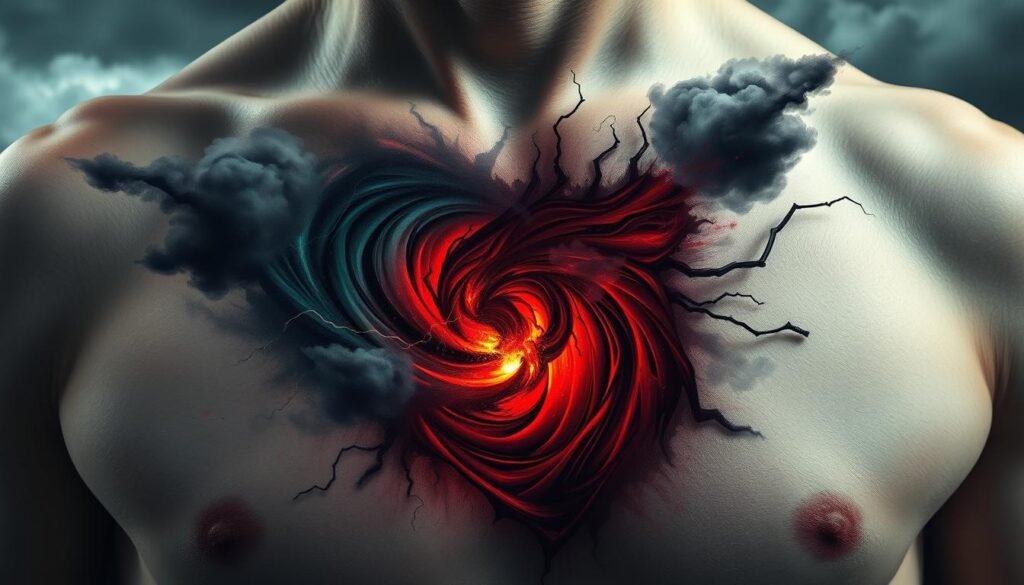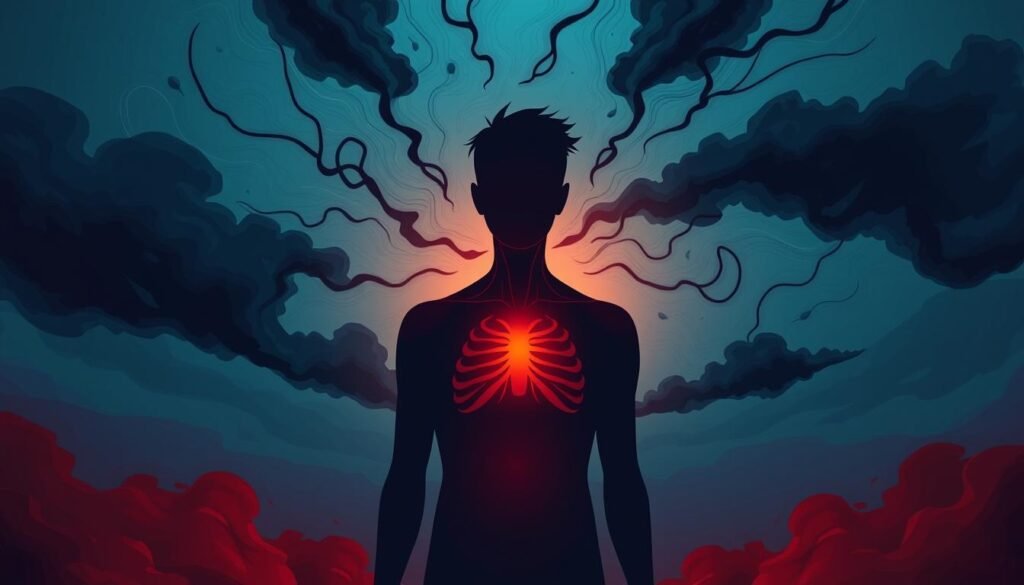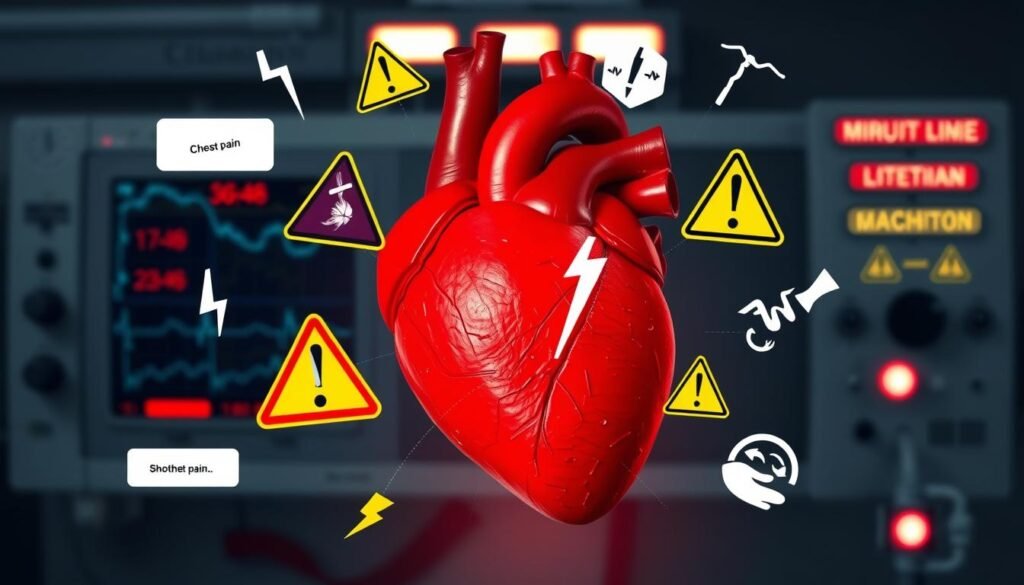Nearly half of the people going to the emergency room for chest pain find no heart problem. Of these, many learn anxiety caused their discomfort. It’s essential to know that anxiety can cause scary symptoms like chest pains. However, not all chest pains are about the heart. Knowing the link between anxiety and physical issues helps us understand how stress affects us. It also shows why telling the difference between anxiety and heart problems is vital.
About 30% of adults will face an anxiety disorder at some point. That’s why it’s critical to address symptoms, both for mental and physical well-being. Ignoring serious chest pain is risky, especially if it’s mistaken for a heart issue. We will explore how anxiety and chest pain are connected. This will help us understand this crucial health issue more clearly.
Key Takeaways
- Almost half of ER visits for chest pain are non-cardiac related.
- Anxiety can manifest as chest tightness, often mimicking heart conditions.
- 30-40% of those with chest pain find anxiety to be the underlying cause.
- Understanding the differences in pain characteristics is crucial.
- Prioritizing mental health can significantly alleviate physical symptoms.
- Effective management techniques exist to reduce anxiety symptoms.
Anxiety Defined
Anxiety is feeling tense or scared when facing threats or stress. This feeling makes the body ready to either fight or escape. Fight-or-flight is this natural reaction. It releases adrenaline and cortisol. These hormones make our mind and body ready to handle danger. Feeling anxious now and then is normal. But feeling anxious all the time can cause problems. This includes physical symptoms like stress-induced chest discomfort.
About 40 million people in the U.S. have anxiety disorders. These mental health issues can cause a lot of symptoms. Sometimes, they feel like more serious health problems. For instance, chest pain is common during panic attacks. This happens to about 20% to 70% of people having them. Also, 30% to 40% of people who go to emergency rooms for chest pain actually have anxiety. This shows why knowing the difference between anxiety chest pain and heart issues is key.
Long-term anxiety might make someone scared of having a serious illness. Managing anxiety well can reduce symptoms like chest pain. Relaxation techniques and cognitive behavioral therapy (CBT) are helpful. For extra help, check out this resource on anxiety chest pain.
Understanding Chest Pain
Chest pain can be confusing and worrisome. It’s important to know that it comes from both physical and psychological places. Chest tightness from anxiety can make you feel more scared. This happens when you think about the pain too much.
People often say psychosomatic chest pain feels sharp or stabbing. Luckily, this kind of pain often goes away quickly. On the other hand, pain from a possible heart attack feels more like squeezing. It gets worse over time and might spread to your arm or jaw. Knowing these differences is key for figuring out what to do next.
Heart attacks usually start when the heart’s blood vessels get blocked. Panic attacks can happen all of a sudden and might not have a clear cause. They come from stress, while heart attacks can occur when you’re resting or doing something strenuous. It’s important to know the causes and signs. This knowledge helps tell apart chest pain from stress and serious heart problems.
About 12–16% of people will have chest pain in their lives. Surprisingly, 20% to 70% of these cases are from panic attacks. Many people report feeling chest tightness during these moments. It’s easy to mix up this kind of pain with heart-related issues.
Can Anxiety Cause Chest Pains?
Anxiety and chest pain often go hand in hand. Many worry they have heart problems when feeling chest pains during a panic attack. In fact, 30% to 50% of these cases stem not from heart issues, but anxiety. Notably, about 25% of people with chest pain in emergency rooms have panic disorders.
Relationship Between Anxiety and Chest Pain
Anxiety can cause chest pain that feels like a heart problem. This pain usually lasts 10 to 30 minutes. It’s important to know this pain, while common, needs to be checked. Especially if you also feel sweaty or sick.
Statistics on Anxiety-Related Chest Pain
A study in 2019 showed 28.5% of people had chest pain with anxiety attacks. Lifestyle factors can affect anxiety too. Drinking caffeine or alcohol might trigger chest pain. Not sleeping enough can also make anxiety worse.
| Statistic | Detail |
|---|---|
| 30-50% | Chest pain cases unrelated to heart issues linked to anxiety disorders |
| 25% | Individuals with panic disorder presenting with chest pain in emergency settings |
| 28.5% | Incidence of chest pain during anxiety attacks |
| 10-30 mins | Typical duration of anxiety-induced chest pain |
| 3 out of 10 | Cases of irritable bowel syndrome associated with anxiety disorders |
The Physiology of Anxiety-Induced Chest Pain
Anxiety creates complex body responses, often leading to chest pain. Understanding these mechanisms helps us grasp anxiety attack symptoms and chest pains from anxiety disorders. Stress hormones are key, preparing the body for fight or flight. This raises heart rate and blood pressure, which might feel like heart issues.
Hormonal Responses to Anxiety
Under anxiety, our bodies release cortisol and adrenaline. These stress hormones cause:
- Increased heart rate
- Elevated blood pressure
- Heightened muscle tension
- Rapid breathing
These hormone surges can lead to chest discomfort or pain. Studies show anxiety accounts for 30% to 40% of chest pain emergency visits. Often, these cases are misdiagnosed, adding stress to those with anxiety disorders.
Physical Symptoms of Anxiety
Physical symptoms of anxiety vary among people. They can include:
- Chest tightness or pressure
- Shortness of breath
- Palpitations
- Dizziness
Such symptoms might be confused with heart disease. Notably, about 28% of people with chest pain and normal angiography are later found to have panic attacks. It’s important to understand this for correct treatment and to ease the chest pains caused by anxiety disorders.
Chronic stress can worsen matters by weakening the immune system and raising risks for diseases like diabetes and depression. Psychological aspects mean stress management, psychotherapy, and certain medications are crucial in treating anxiety disorders.
| Hormone | Effect on Body | Connection to Anxiety |
|---|---|---|
| Cortisol | Increases glucose availability, suppresses immune response | Heightens stress response, may lead to chronic anxiety |
| Adrenaline | Boosts heart rate and blood pressure | Triggers fight or flight response, contributing to chest pain |
Recognizing these physical and emotional signs can help us manage anxiety-related chest pains better. For more on how anxiety and chest pain are linked, check out this research.
Symptoms of Anxiety vs. Cardiac Chest Pain
Knowing the difference between chest pain from anxiety and heart issues is key. It can save lives to understand what sets these conditions apart. Anxiety and heart issues can feel similar. But, they have small but important differences.
Key Differences in Chest Pain Characteristics
There are different types of chest pain. But, it’s important to know how anxiety pain and heart condition pain differ.
- Location: Anxiety pain usually stays in the chest. Heart condition pain might spread to arms, neck, jaw, or back.
- Nature of Pain: Panic attacks can cause sharp pain. Heart attacks feel more like pressure or a heavy feeling.
- Duration: Panic attack symptoms often last a short time. Heart attack symptoms can last longer and may not go away.
- Triggers: Emotional stress might lead to panic attacks. Physical activity can trigger heart attacks.
Common Symptoms of Heart Conditions
It’s vital to know the signs of heart problems to get help on time. Some common signs are:
- Chest pain or pressure
- Heartbeat that feels too fast or irregular
- Feeling short of breath
- Feeling nauseous or light-headed
- Comfort issues in the upper body, like in arms or neck
Women might feel other symptoms, such as nausea or extreme tiredness. These can seem like anxiety. Knowing the difference can save lives. If these symptoms are new or getting worse, getting medical help is crucial.
How Anxiety Triggers Chest Pain
Anxiety often leads to chest pain from stress. It shows how common this issue is for many. When we feel very anxious or have panic attacks, our bodies change a lot. Our heart beats faster, our muscles get tight, and we may breathe too quickly. These changes can make us feel like we have a serious health problem.
One in four people will feel chest pain because of anxiety. Anxiety affects how our bodies react. Symptoms often start before age 21, leading to panic attack chest pain. This pain usually goes away in about 10 minutes. But, other symptoms can last longer, sometimes over an hour.
How long this chest pain lasts differs from person to person. It’s hard to say exactly how long it will last. Studies show that many who go to the ER with chest pain don’t have heart issues. This tells us that anxiety plays a big part in this type of chest pain. It impacts many people. To learn more about anxiety and chest pain, check here.

Types of Chest Pain Associated with Anxiety
Knowing about the different chest pains from anxiety helps people understand their feelings better. Anxiety shows up in various ways, causing either sharp or dull chest sensations. Spotting these signs helps tell apart chest pain from anxiety and other causes.
Sharp vs. Dull Pain
When feeling anxious, chest tightness can feel quite different from person to person. Mainly, it’s either a sharp or a dull feeling.
- Sharp Pain: This type hits suddenly and hard. It might feel like a stab or pinch in the chest. It could make panic worse, making the feeling more intense.
- Dull Pain: Dull pain feels more like heavy pressure or discomfort. It’s not as sharp but can bother you for a longer time.
Location of Pain in the Chest
The pain’s spot is also crucial for figuring out the symptoms. Anxiety-related chest pain usually pops up in certain areas:
- Center of the Chest: A common complaint is feeling a tight or uncomfortable sensation right in the middle of the chest. This often worries people about their hearts.
- Left Side of the Chest: Sometimes, the pain is on the left side. This can scare people into thinking it’s heart-related, but it often ties back to anxiety.
Panic Attacks and Chest Pain
Panic attacks can be really scary. They come with many symptoms that can freak you out. One scary symptom is chest pain. This can make you worry a lot about your health. It’s important to know how this chest pain is different from other serious health issues.
Symptoms of a Panic Attack
Common anxiety attack symptoms can include:
- Rapid heart rate or palpitations
- Shortness of breath or a feeling of choking
- Chest pain or discomfort
- Trembling or shaking
- Sweating
- Feelings of unreality or detachment
- Fear of losing control or “going crazy”
- Fear of dying
Chest pain during a panic attack can feel very intense. It might even make you think you’re having a heart attack. Many people experience this scary symptom during their panic attacks.
Duration and Relief of Panic-Related Chest Pain
Panic attack chest pain can last for a little while. Sometimes, it feels like it keeps coming back. It might even leave your chest feeling sore afterwards. Knowing that this chest pain is linked to panic attacks can make it less scary. Panic symptoms usually get better within 20 to 30 minutes. But it’s important to know when they happen and how to deal with them.

There are ways to help manage panic attacks. Cognitive behavioral therapy (CBT) and mindfulness can be really helpful. They teach you to recognize and handle the symptoms of anxiety attacks. This can make future episodes easier to deal with. Medications, like SSRIs, can also help. If you’re having panic attacks, talking to a healthcare provider is a good idea. They can help you figure out the best treatment plan.
Managing Anxiety-Related Chest Pain
Anxiety-related chest pain can feel intense. But, you can manage it effectively. Using relaxation techniques and making lifestyle changes can lessen your anxiety. This can also boost your health overall.
Relaxation Techniques
There are many ways to ease anxiety-related chest pain. Relaxation methods not only bring peace. They also shift your focus from the pain:
- Yoga: It combines physical moves and breathing to improve your mind and body’s health.
- Meditation: A practice that brings inner calm and lowers anxiety.
- Deep Breathing Exercises: Simple steps that balance your heart rate and ease anxiety quickly.
Lifestyle Changes for Anxiety Management
Making changes in your life can better handle anxiety. This might also cut down chest pain. Here are some tips:
- Regular Exercise: Physical activities boost endorphins, making you feel better and less stressed.
- Healthy Diet: Eating foods full of nutrients supports your health and helps with anxiety.
- Reducing Caffeine Intake: Drinking less caffeine reduces anxiety and tension.
Using these relaxation and lifestyle tips can help you manage your mental health. Staying on track with them might lower your anxiety and chest pain.
When to Seek Medical Attention
Chest pain can often be alarming. It’s crucial to know when to seek medical help. This knowledge can make the difference, especially in sorting out if the discomfort is due to anxiety or a heart issue. It’s key to recognize the signs of potential heart problems when you feel unusual chest pain.
Signs Indicating Potential Heart Issues
Knowing critical symptoms can save lives. Here are signs that might point to heart issues:
- Radiating pain to the arms, neck, jaw, or back
- Shortness of breath with or without chest discomfort
- Nausea or lightheadedness
- Excessive sweating without a clear reason
- Unexplained fatigue that lasts for days
Emergency Symptoms to Consider
There are emergency symptoms that need immediate medical attention:
- Any chest pain that feels different or unusual
- Chest pain lasting more than a few minutes
- Severe anxiety with the chest pain
- Persistent or worsening discomfort

About 40 million Americans deal with anxiety. This often includes chest pains that last roughly 10 minutes. It’s important to know when these symptoms are severe. Many people go to the ER with chest pain that isn’t dangerous but feel very anxious. This shows why it’s vital to tell the difference between anxiety-related discomfort and real heart issues.
| Symptom | Indicates |
|---|---|
| Radiating Pain | Possible heart attack |
| Shortness of Breath | Potential heart or lung issue |
| Nausea | Heart-related distress |
| Lightheadedness | Sign of heart trouble |
| Excessive Sweating | Panic attack or heart problem |
Seeking immediate medical help can save your life. Always put your safety first if you have chest pain. Make sure to get emergency symptoms checked right away.
Psychosomatic Chest Pain Explained
Psychosomatic chest pain is when your mind affects your body, making you feel real pain in your chest because of stress or anxiety. It’s important to know this pain is real and common, affecting up to 25% of adults in the U.S. This shows how often people might feel chest pain that’s not from the heart.
Many people rush to the emergency room thinking they have heart problems when they don’t. In fact, 50% to 75% of these visits end up not being about the heart. This shows how crucial it is to understand psychosomatic chest pain. It comes in different types, like being unexplained, caused by stress, or not related to heart issues.
When you’re anxious, your body releases stress hormones that can make your heart race, make you sweat, breathe fast, or feel stomach pain. This can happen along with the psychosomatic chest pain. People describe this pain in many ways – sharp, tight, pressured, burning, or just a dull ache. Anxiety-related chest pain usually hits suddenly, lasts about 10 minutes, and might leave your chest feeling sore.
To manage psychosomatic chest pain well, it’s key to understand the mental signs like panic or fear. Making changes in your life, like exercising, can help a lot. It reduces tension and boosts happy chemicals in your brain. Taking care of your mind and body together helps you find a good way to get better.
| Type of Pain | Description | Duration |
|---|---|---|
| Pain from Anxiety | Sharp, tight, pressure, or dull ache | Typically lasts around 10 minutes, possible lingering soreness |
| Heart Attack Pain | Feels like intense pressure or squeezing | Lasts longer than 20 minutes, worsens with activity |
Conclusion
Anxiety often leads to physical signs, including chest pain. This is very common, especially when stress levels are high. Knowing about anxiety and heart issues is key. That’s because many people with anxiety feel chest pain too. About 48% of those with generalized anxiety disorder have felt chest pain at least once. This shows how important good treatments are in urgent care.
If you’re dealing with anxiety-induced chest pain, it’s vital to pay attention to your symptoms. This can improve your health. Doing relaxation exercises like deep breathing and meditation helps a lot. If you need more help, see an Anxiety Specialist. They know a lot about anxiety and heart issues. They can offer ways to lower anxiety at stressful jobs.
In the end, while anxiety can cause hard symptoms like chest pain, taking care of yourself is crucial. Be proactive and stay informed about your health. This can help you manage anxiety-related chest pain and keep you healthy. For more info on how anxiety links to chest pain, look at studies like this one.